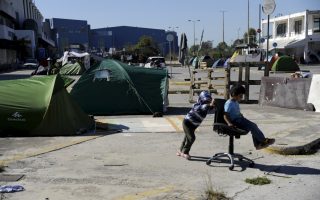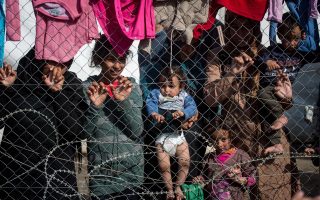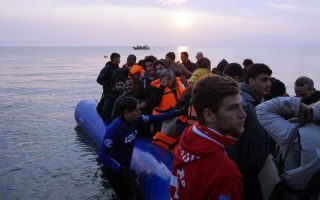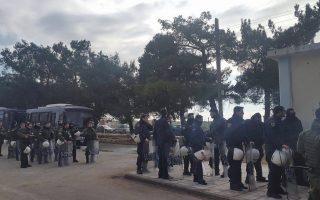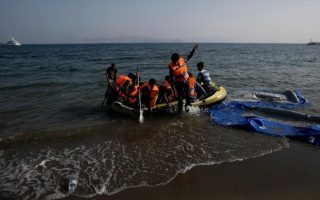Men who survived migrant shipwreck in Mediterranean describe ordeal
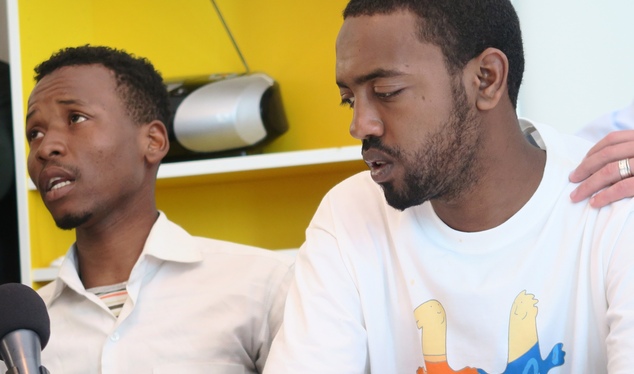
Two men who were among 41 people picked up over the weekend from a boat found adrift in the Mediterranean Sea described on Thursday surviving what they say was a shipwreck that might have killed up to 500 people.
If confirmed, the sinking, which would have taken place sometime last week, would be one of the deadliest migrant boat sinkings in the Mediterranean. So far, there has been no independent confirmation of a mass casualty tragedy at sea. The coast guard authorities of Italy, Greece, Libya and Egypt haven't confirmed a sinking, and there haven't yet been any reports of bodies or debris washing ashore.
Muaz Mahmud Aymo, a 25-year-old Ethiopian, and Mowlid Isman, a 28-year-old Somali, said they had been heading to Italy, leaving the Libyan port city of Tobruk at night on a boat with about 200 people on board. They said smugglers forced them onto a larger boat, which they said already had about 300 people on board although it was dark and they couldn't see inside.
The larger boat sank during the transfer of people from the smaller vessel, they said, and all died except 31 people who were still on the smaller boat and 10 more, including the two of them, who were picked up from the sea by Somalis who were still on the smaller boat.
"The people all, they die on that ocean," said Aymo, who said his 2-month-old baby and 20-year-old wife were among the fatalties. Isman said he lost his sister and his sister's baby.
Aymo said the smugglers had told them the journey, for which each passenger paid $1,800, would be safe.
"They say: 'You are gonna go to Italy. Today. Tonight. No problem. You are safe,'" he told reporters in Athens. But the smugglers forced them onto the larger boat, which he described as a wooden vessel of about 30 meters. Both said they saw those on board struggling in the water and dying.
"We saw the dead people with our eyes," Isman said, speaking through an interpreter.
They managed to swim to the smaller boat and get on board, but the smuggler who was navigating refused to wait and help others still struggling in the sea, the two said. Instead, he motored away, ignoring the pleas from the crying survivors and at one point brandishing a knife at Aymo and threatening to kill him, he said.
It is unclear where the sinking might have taken place. The 41 picked up on Saturday by a passing cargo ship and ferried to Greece had been adrift for three days, Aymo said, after the boat's engine broke down. They were picked up 95 nautical miles (110 miles) southwest of the Greek mainland and taken to the southern Greek city of Kalamata.
The two gave their accounts during a brief news conference in Athens. Officials from the U.N. refugee agency and the Greek aid group Praxis, in whose facility the news conference was being held, asked reporters not to push the two with tough questions as they had survived traumatic events.
The International Organization for Migration has also provided accounts of the sinking based on survivor accounts, though its version varied slightly to that of the UNHCR.
Aymo said that the smaller boat's engine broke down soon after the sinking. The smuggler, who was still on board, called for help and another boat arrived to take him. As he left, he threw the passengers' cellphones into the sea, and tossed them another telephone — which from its description sounded like a hand-held satellite phone. He promised to return to fix the engine and bring food and water, but never did.
Aymo said the passengers were so distraught they forgot about the phone for three days, as they drifted hopelessly and ran low on water and food. On the third day, he remembered the phone and saw there was an Italian number stored in it. When he dialed, he got through to Italian authorities who organized the rescue by the passing cargo ship.
Italian coast guard spokesman Cmdr. Filippo Marini said the Italian coast guard received a call on Saturday from someone among the 41 migrants who were aboard a yacht in waters that are part of the Greek search-and-rescue area.
The Italians immediately rerouted a merchant ship in the area to rescue them, as often happens when the closest ship to a distressed boat happens to be a commercial vessel.
"Time is important," Marini said.
Meanwhile, NATO Secretary-General Jens Stoltenberg said in Turkey's capital that efforts to stem the tide of migrants seeking the shores of Europe are working.
Speaking at a news conference with Turkish Foreign Affairs Minister Mevlut Cavusoglu in Ankara, Stoltenberg said the collective effort is "making a difference" and that the number of migrants crossing the Aegean Sea is "going significantly down."
Under an EU-Turkey deal signed last month, migrants arriving on Greek islands from the Turkish coast from March 20 onwards face deportation to Turkey unless they successfully apply for asylum in Greece.
Stoltenberg said Turkey, based on information that NATO provides, is "taking action to help break the business model of traffickers."
But, he warned, the fight against trafficking requires "flexibility" as smugglers can "shift their routes rapidly."
The migrant crisis, Stoltenberg added, demonstrates how urgent it is to find a solution to the Syrian conflict.
Turkey, which borders Syria, is home to 2.7 million Syrian refugees.
[AP]
